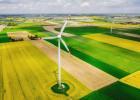H2020 European Islands Facility NESOI Project: New energy solutions optimized for islands
- Type Project
- Status Filled
- Execution 2019 -2024
- Assigned Budget 9.996.280,00 €
- Scope Europeo
- Main source of financing Horizon 2020
- Project website Proyecto European Islands Facility NESOI
Experts in island energy transition and financial instruments have joined forces to help island communities achieve efficient and sustainable energy solutions. This is aligned with the EU's clean energy priorities. Specifically, the EU-funded NESOI project will pave the way for training, technical support, cooperation, and financing opportunities for islands. NESOI will establish a physical and digital platform to provide technical assistance to local authorities and communities to secure financing and the necessary skills to implement the investments needed to implement the islands' energy transition plans. NESOI will leverage the consortium's project expertise and, through its platform, aims to mobilize more than €100 million in sustainable energy investments by 2023, resulting in an expected energy savings of 440 GWh/year.
With the project's completion on February 29, 2024, all activities planned in the work plan have been completed. The results include: - Development of the NESOI digital platform. This platform is a central hub for connecting developers, local authorities, technology experts, and financial providers. Whether an interested party is seeking advice, partners, or financial and technical solutions, the NESOI platform is the one-stop resource. With over 500 registered users, it focuses on connecting investors, technology providers, and experts with projects that fit their interests and objectives.
Currently, 105 projects are presented, offering various collaboration and investment opportunities. The platform also serves as a portal for publishing crowdfunding campaigns, allowing interested parties to expand the reach of their projects and attract support from a broader audience.
The platform also offers personalized recommendations for online training content, allowing online audiences to improve their skills and experience in relevant fields.
- 54 initiatives benefit from NESOI's tailored technical assistance and financial support. More than 70 islands in 12 countries were selected and were eligible to receive targeted support to develop their project plans and investments. Over €3 million in cascade funding has been allocated to the islands. Beyond technical assistance, the supported initiatives attracted the attention of public and private financial institutions across Europe. This has enabled the activation of a total of €88 million in funding from various sources (EU, national, regional, private, and public) and the mobilization of €567 million in investments.
- Technical assistance was also complemented by long-term coaching activities to ensure NESOI beneficiaries have greater capacity to develop investable energy transition projects.
- Four activities were carried out in parallel:
- Individual coaching, as a direct follow-up to technical assistance activities, with regular individual contacts established with each beneficiary of the 54 NESOI-supported projects. This activity culminated in individual e-learning programs communicated to each NESOI beneficiary, tailored to their needs, identified through individual interviews.
- The organization of five collaborative webinars, which allowed beneficiaries of NESOI-supported projects to discuss and share relevant topics. The topics included energy planning, electric mobility, renewable energy, energy communities, and hydrogen.
- The development of e-learning materials with informative and educational content available on the NESOI platform.
- The ERASMUS programme consists of three short study tours (SSTs) conducted with guests selected from among NESOI beneficiaries and organized by island organizations with a track record in energy transition projects: SST1 in Astipalaia (Greece), organized by Dafni and the Municipality of Astipalaia, on the Energy Community and RES facilities; SST2 in Sicily (Italy), organized by the Port Authority of Messina, ENEA and CNR, on clean ports and vessels; and SST3 in the Orkney Islands (UK), organized by EMEC and PlusZero, on Green H2 and marine renewable energy.
- A Replication Guide (in 6 languages) has been published to facilitate replication in EU islands.
- The consortium actively participated in communication and dissemination events, contributing to the exchange of knowledge and best practices. More than 95 events were attended. Social media channels were leveraged, reaching a community of more than 123,000 people.
- The NESOI consortium has defined its exploitation strategy, which will result in a partnership that will endure beyond the life of the project. Furthermore, the CEN Workshop Agreement process has begun to standardize the methodology designed by NESOI.
The EU makes funds available to finance energy efficiency and renewable energy projects to meet its decarbonization goals. Many islands are at the forefront of the energy transition; however, most lack the expertise to launch concrete investments, access financing, and drive projects forward. The EU Islands Facility (NESOI) aimed to fill this gap through a practical approach, unleashing the potential of EU islands to become drivers of the European Energy Transition, mainstreaming green energy investments to an audience of over 2,200 inhabited EU islands, and providing the opportunity to deploy their innovative energy technologies and approaches in a cost-competitive manner.
Starting with a comprehensive survey that captured the needs of EU islands, NESOI provides both indirect and direct support to the islands:
- A digital platform, a one-stop shop for the islands where they can find ideas and effective organizational, technical, and financial tools for the entire value chain of a project, and a cooperative space for project promoters, investors, and technology providers.
- A cascading mechanism, based on transparent technical, social, economic, and environmental criteria, to identify a shortlist of projects that will receive personalized technical assistance from consortium experts and external advisors.
Through two open calls, NESOI selected 54 initiatives, involving 70 islands in 12 different countries, to receive technical assistance and advance their ideas and project plans toward concrete implementation. In total, €567 million in investment has been mobilized, and local authorities have committed to their implementation.
In addition, €88 million in funding has already been secured thanks to the assistance received. The initiative will contribute to European decarbonization goals by avoiding 442 ktCO2/year of GHG emissions.
Funds are available to finance energy efficiency and renewable energy projects. Many islands are undergoing an energy transition; however, most lack the necessary experience to launch concrete investments, access financing, and launch projects. NESOI aims to fill this gap through a practical approach that will enable the desired financial leverage for the effective implementation of the islands' energy transition plans.
Starting with a comprehensive survey that compiles the needs of EU islands, NESOI provides a platform where islands can access direct and indirect support:
- Provided through a custom-built digital platform, indirect support consists of training materials, best case examples, a toolkit for technical and economic best practices, and a collaborative space for islands, investors, and technology developers.
Based on transparent technical, social, economic, and environmental criteria, NESOI selects projects to receive personalized direct support from consortium experts and external experts for local aspects through a cascading mechanism. NESOI supports projects at different stages of development, from early stages requiring high-level technical and financial assistance to more advanced stages requesting specific and detailed contributions in various fields (technical, legal, financial), introducing a reality-checking approach so that islands focus on solid projects with the potential to attract investors. NESOI implements capacity-building and training activities to ensure awareness and capacity building among public authority staff to develop investable projects with the aim of empowering local communities in their successful pursuit of energy transition. Extensive communication activities at the EU level and links with other initiatives such as BRIDGE and the Cities Facility are also planned.
NESOI partners are strongly connected to investors, island communities, and the energy innovation ecosystem, and intend to develop a sustainable business model for the NESOI platform.
In RP3, the NESOI consortium’s efforts have focused on achieving the following outcomes: Full implementation and roll-out of the NESOI platform Implementation of the projects selected in the second call and roll-out of technical assistance Full allocation of cascading funds to island beneficiaries Coaching activities for island staff, with a focus on NESOI Erasmus for Islands (short study tours for island energy managers to deepen their understanding of best practices).
Improved dissemination and communication, and organization of the final conference Defining the exploitation of NESOI beyond the project duration The main results achieved by concluding NESOI have been: More than 70 EU islands directly supported by NESOI €88 million of funds secured and €567 million mobilized, with the potential to trigger up to >€1 billion in investments in the energy transition Enhanced capacity and skills of technicians, through training campaigns and 3 Erasmus short study tours (24 selected beneficiaries participated in these) Development of a digital platform available online, as a single marketplace to make the project promoter, investors and technology provider meet; The impacts achieved at the end of the project are: Primary energy savings: 1021 GWh/year GHG emissions savings: 442 tCO2/year RES production: >22% share in the islands NESOI has also contributed to increasing the quality of life on EU islands, promoting the reduction of local energy bills and improving the local environment thanks to the promotion and investments in low carbon energy, reducing depopulation and migration from the islands to the mainland, ensuring the preservation of local communities and socio-economic-cultural heritage.
- SINLOC-SISTEMA INIZIATIVE LOCALI SPA (Sinloc SpA)







